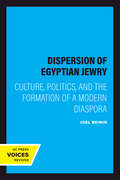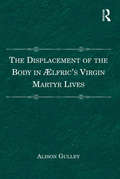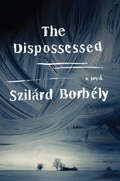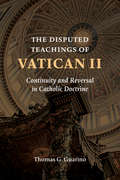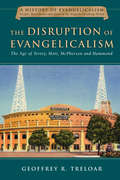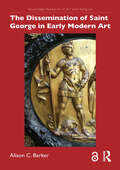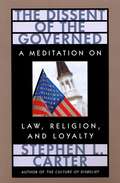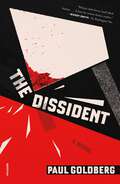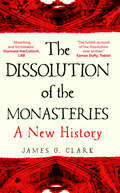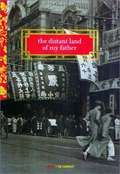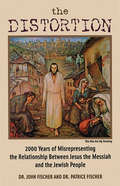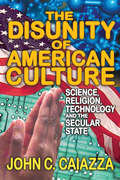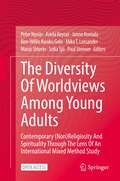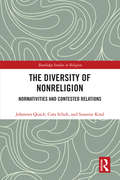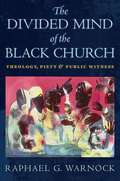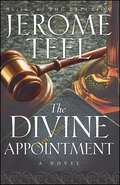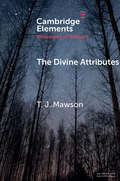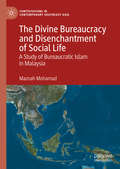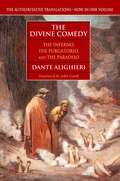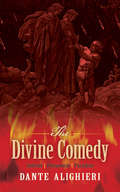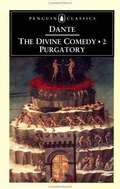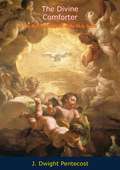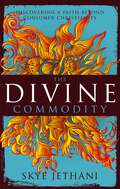- Table View
- List View
The Dispersion of Egyptian Jewry: Culture, Politics, and the Formation of a Modern Diaspora (Contraversions: Critical Studies in Jewish Literature, Culture, and Society #11)
by Joel BeininIn this provocative and wide-ranging history, Joel Beinin examines fundamental questions of ethnic identity by focusing on the Egyptian Jewish community since 1948. A complex and heterogeneous people, Egyptian Jews have become even more diverse as their diaspora continues to the present day. Central to Beinin's study is the question of how people handle multiple identities and loyalties that are dislocated and reformed by turbulent political and cultural processes. It is a question he grapples with himself, and his reflections on his experiences as an American Jew in Israel and Egypt offer a candid, personal perspective on the hazards of marginal identities.
The Displacement of the Body in Ælfric's Virgin Martyr Lives
by Alison GulleyThe Displacement of the Body in Ælfric's Virgin Martyr Lives addresses 10th-century Old English hagiographical translations, from Latin source material, by the abbot and grammarian Ælfric. The vitae of Agnes, Agatha, Lucy, and Eugenia, and the married saints Daria, Basilissa, and Cecilia, included in Ælfric's s Old English Lives of Saints, recount the lives, persecution, and martyrdom of young women who renounce sex and, in the first four stories, marriage, to devote their lives to Christian service. They purport to be about the primacy of virginity and the role of the body in attaining sanctity. However, a comparison of the Latin sources with Ælfric's versions suggests that his translation style, characterized by simplifying the most important meanings of the text, omits certain words or entire episodes that foreground suppressed female sexuality as key to sainthood. The Old English Lives de-emphasize the physical nature of faith and highlight the importance of spiritual purity. In this volume, Alison Gulley explores how the context of the Benedictine Reform in late Anglo-Saxon England and Ælfric's commitment to writing for a lay audience resulted in a set of stories depicting a spirituality distinct from physical intactness.
The Dispossessed: A Novel
by Szilard BorbelyA literary sensation on its original publication in Hungary, this hypnotic, hauntingly beautiful first novel from the acclaimed, award-winning poet and author Szilárd Borbély depicts the poverty and cruelty experienced by a partly-Jewish family in a rural village in the late 1960s and early 1970s."No one has ever written so beautifully and at the same time so without pity about the suffering in the isolated provincial villages of Hungary...His sentences have a surgical precision, and their sustained rhythm only reinforces the power of what they evoke."--Nicole Henneberg, Frankfurter Allgemeine ZeitungIn a tiny village in northeast Hungary, close to the Romanian border, a young, unnamed boy warily observes day-to-day life and chronicles his family's struggles to survive. Like most of the villagers, his family is desperately poor, but their situation is worse than most--they are ostracized because of his father's Jewish heritage and his mother's connections to the Kulaks, who once owned land and supported the fascist Horthy regime before it was toppled by Communists. With unflinching candor, the little boy's observations are related through a variety of narrative voices--crude diatribes from his alcoholic father, evocative and lyrical tales of the past from his grandparents, and his own simple yet potent prose. Together, these accounts reveal not only the history of his family but that of Hungary itself, through the physical and psychic traumas of two World Wars to the country's treatment of Jews, both past and present. Drawing heavily on Borbély's memories of his own childhood, The Dispossessed is an extraordinarily realistic novel. Raw and often brutal, yet glimmering with hope, it is the crowning achievement of an uncompromising talent.
The Disputed Teachings of Vatican II: Continuity and Reversal in Catholic Doctrine
by Thomas G. GuarinoThe Second Vatican Council (1962–1965) radically shook up many centuries of tradition in the Roman Catholic Church. This book by Thomas Guarino, a noted expert on the sources and methods of Catholic doctrine, investigates whether Vatican II&’s highly contested teachings on religious freedom, ecumenism, and the Virgin Mary represented a harmonious development of—or a rupture with—Catholic tradition.Guarino&’s careful explanations of such significant terms as continuity, discontinuity, analogy, reversal, reform, and development greatly enhance and clarify his discussion. No other book on Vatican II so clearly elucidates the essential theological principles for determining whether—and to what extent—a conciliar teaching is in continuity or discontinuity with antecedent tradition.Readers from all faith traditions who care about the logic of continuity and change in Christian teaching will benefit from this masterful case study.
The Disputed Teachings of Vatican II: Continuity and Reversal in Catholic Doctrine
by Thomas G. GuarinoThe Second Vatican Council (1962–1965) radically shook up many centuries of tradition in the Roman Catholic Church. This book by Thomas Guarino, a noted expert on the sources and methods of Catholic doctrine, investigates whether Vatican II&’s highly contested teachings on religious freedom, ecumenism, and the Virgin Mary represented a harmonious development of—or a rupture with—Catholic tradition.Guarino&’s careful explanations of such significant terms as continuity, discontinuity, analogy, reversal, reform, and development greatly enhance and clarify his discussion. No other book on Vatican II so clearly elucidates the essential theological principles for determining whether—and to what extent—a conciliar teaching is in continuity or discontinuity with antecedent tradition.Readers from all faith traditions who care about the logic of continuity and change in Christian teaching will benefit from this masterful case study.
The Disruption of Evangelicalism: The Age of Torrey, Mott, McPherson and Hammond (History of Evangelicalism Series #4)
by Geoffrey R. TreloarThe Disruption of EvangelicalismThe Disruption of Evangelicalism
The Dissemination of Saint George in Early Modern Art (Routledge Research in Art and Religion)
by Alison C. BarkerFocusing on England, the German-speaking territories and the Italian peninsula, this book examines how Saint George’s image crossed boundaries and was disseminated.Alison Barker attempts to "dissolve" the boundary of the Alps through examination of images of Saint George, the "travelling" saint. She argues that George’s status as chivalric hero and Christian martyr made him uniquely qualified to cross boundaries in this way, especially through the networks of courts and court culture. Her research demonstrates how the highly recognisable iconography of Saint George’s image meant something different, depending on where he was represented and who was looking at him. Through four case studies that examine how he was depicted and viewed across boundaries of space and media, this book charts a multi-layered cultural network, linking different artists and audiences from three regions. Each case study makes a claim about Saint George and how he acts and is used by four sections of society: rulers, artists, corporate groups and the broad masses.The book will be of interest to scholars working in art history, religious history and Renaissance studies.
The Dissent of the Governed: A Meditation on Law, Religion, and Loyalty (The William E. Massey Sr. Lectures in the History of American Civilization #9)
by Stephen L. CarterBetween loyalty and disobedience; between recognition of the law's authority and realization that the law is not always right: In America, this conflict is historic, with results as glorious as the mass protests of the civil rights movement and as inglorious as the armed violence of the militia movement. In an impassioned defense of dissent, Stephen L. Carter argues for the dialogue that negotiates this conflict and keeps democracy alive. His book portrays an America dying from a refusal to engage in such a dialogue, a polity where everybody speaks, but nobody listens. The Dissent of the Governed is an eloquent diagnosis of what ails the American body politic--the unwillingness of people in power to hear disagreement unless forced to--and a prescription for a new process of response. Carter examines the divided American political character on dissent, with special reference to religion, identifying it in unexpected places, with an eye toward amending it before it destroys our democracy. At the heart of this work is a rereading of the Declaration of Independence that puts dissent, not consent, at the center of the question of the legitimacy of democratic government. Carter warns that our liberal constitutional ethos--the tendency to assume that the nation must everywhere be morally the same--pressures citizens to be other than themselves when being themselves would lead to disobedience. This tendency, he argues, is particularly hard on religious citizens, whose notion of community may be quite different from that of the sovereign majority of citizens. His book makes a powerful case for the autonomy of communities--especially but not exclusively religious--into which democratic citizens organize themselves as a condition for dissent, dialogue, and independence. With reference to a number of cases, Carter shows how disobedience is sometimes necessary to the heartbeat of our democracy--and how the distinction between challenging accepted norms and challenging the sovereign itself, a distinction crucial to the Declaration of Independence, must be kept alive if Americans are to progress and prosper as a nation.
The Dissident: A Novel
by Paul Goldberg“A feast for serious fiction readers.” —Wendy Smith, The Washington Post“A dead-serious, dead-funny, no-he-didn't marvel.” —Joshua Cohen, author of The NetanyahusA thrilling, witty, and slyly original Cold War mystery about a ragtag group of Jewish refuseniks in Moscow.On his wedding day in 1976, Viktor Moroz stumbles upon a murder scene: two gay men, one of them a U.S. official, have been axed to death in Moscow. Viktor, a Jewish refusenik, is stuck in the Soviet Union because the government has denied his application to leave for Israel; he sits “in refusal” alongside his wife and their group of intellectuals, Jewish and not. But the KGB spots Viktor leaving the murder scene. Plucked off the street, he’s given a choice: find the murderer or become the suspect of convenience. His deadline is nine days later, when Henry Kissinger will be arriving in Moscow. Unsolved ax murders, it seems, aren’t good for politics.A whip-smart, often hilarious Cold War thriller, Paul Goldberg’s The Dissident explores what it means to survive in the face of impossible choices and monumental consequences. To help solve the case, Viktor ropes in his community, which includes his banned-text-distributing wife, a hard-drinking sculptor, a Russian priest of Jewish heritage, and a visiting American intent on reliving World War II heroics. As Viktor struggles to determine whom to trust, he’s forced to question not only the KGB’s murky motives but also those of his fellow refuseniks—and the man he admires above all: Kissinger himself.Immersive, unpredictable, and always ax-sharp, The Dissident is Cold War intrigue at its most inventive. It is an uncompromising look at sacrifice, community, and the scars of history and identity, from an expert storyteller.
The Dissolution of the Monasteries: A New History
by James ClarkThe first account of the dissolution of the monasteries for fifty years—exploring its profound impact on the people of Tudor England "This is a book about people, though, not ideas, and as a detailed account of an extraordinary human drama with a cast of thousands, it is an exceptional piece of historical writing."—Lucy Wooding, Times Literary Supplement Shortly before Easter, 1540 saw the end of almost a millennium of monastic life in England. Until then religious houses had acted as a focus for education, literary, and artistic expression and even the creation of regional and national identity. Their closure, carried out in just four years between 1536 and 1540, caused a dislocation of people and a disruption of life not seen in England since the Norman Conquest. Drawing on the records of national and regional archives as well as archaeological remains, James Clark explores the little-known lives of the last men and women who lived in England’s monasteries before the Reformation. Clark challenges received wisdom, showing that buildings were not immediately demolished and Henry VIII’s subjects were so attached to the religious houses that they kept fixtures and fittings as souvenirs. This rich, vivid history brings back into focus the prominent place of abbeys, priories, and friaries in the lives of the English people.
The Distant Land of My Father
by Bo CaldwellFor Anna, the narrator of Bo Caldwell's richly lyrical and vivid first novel, growing up in the magical world of Shanghai in the 1930s and 1940s creates a special bond between her and her father. He is the son of missionaries, a smuggler, and a millionaire who leads a charmed but secretive life. When the family flees to Los Angeles in the face of the Japanese occupation, he chooses to remain, believing his connections and luck will keep him safe. He's wrong. He survives, only to again choose Shanghai over his family during the Second World War. Anna and her father reconnect late in his life, when she finally has a family of her own, but it is only when she discovers his extensive journals that she is able to fully understand him and the reasons for his absences. With the intensity and appeal of When We Were Orphans, also set in Shanghai at the same time, The Distant Land of My Father tells a moving and unforgettable story about a most unusual father-daughter relationship.
The Distant Shore: Stories of Love and Faith in the Afterlife
by Linda Hale BucklinLinda Hale Bucklin made a pact with her husband, Bill, to communicate after death. Here she shares her personal experience and other stories of love and faith in the afterlife.We all deal with grief in different ways. Bill, my beloved husband of forty years, died unexpectedly after a short illness. As shocked and devastated as I was, I came to accept that his not lingering was his final earthly gift to me. Moreover, he honored our agreement, coming to me in dreams and through music, showing me that death may end a life, but a relationship with one we love endures.Bill’s guiding spirit shows me I am stronger than I think. As he encourages me to appreciate the beauty and wholeness of this life, I find unexpected riches in my family, friends, and nature. I am comforted, knowing Bill and I will be together again one day. I hope this book will bring solace, peace, and hope to others."If you have ever wondered if there is an afterlife, The Distant Shore will give you faith. This book will profoundly touch your heart, fill you with hope and joy, and encourage you to be more mindful in your daily life." ~SUSAN SMITH JONES, PHD"As Linda Bucklin’s friend and co-author of Come Rain or Come Shine: Friendships about Women, I’ve been one of her life witnesses for 25 years. The Distant Shore carries us into her lifelong quest for a deeper understanding and experience of love. We celebrate Linda’s successes, weep with compassion over her losses, and see our own lives differently as a result. Most of all, this book inspires us to reflect on our own connection to that distant shore." ~MARY KEIL, AUTHORAbout Linda Hale BucklinA fourth-generation San Franciscan, Linda Bucklin has worked in public relations and as a freelance writer. Her articles have appeared in House & Garden, Journal of Commerce, and Nob Hill Gazette. She now lives in Mill Valley and feels blessed to be surrounded by her three sons, two daughters-in-law, and four grandchildren.With Mary Keil, she wrote Come Rain or Come Shine (Adams Press, 1999), a book about women’s friendships. More recently, she received accolades for Beyond His Control (ePublishing Works, 2008), her memoir about growing up in a privileged family that was shattered with the suicide of her beloved mother. The book went on to become a New York Times Bestseller in paperback and ebook editions.The Love of Angels (ePublishing Works, 2016), her third book, a collection of stories, including the author’s own, chronicles encounters with angels, spiritual beings, and living people who show up to remind us of love’s power. In The Distant Shore, her fourth book, a combination of her thoughts and memories together with others’ stories, written after her husband died in 2016, she explores the possibility of life after death.Linda served for many years as a trustee of Grace Cathedral. A nationally ranked tennis player, in 2006 she became #1 in the U.S. in 60’s mixed doubles with her long-time partner Charlie Hoeveler. Linda now holds six national titles. In addition to her family and friends, her other passions include duplicate bridge (she recently became a Life Master), fly-fishing, and camping under the star-studded Montana sky.
The Distortion: 2000 Years of Misrepresenting the Relationship Between Jesus the Messiah and the Jewish People
by Dr John Fischer Dr Patrice FischerThe Distortion describes how misunderstandings began, how they continued through the last two millennia, what it has cost, not only the Jewish people, but also the Church.
The Disunity of American Culture: Science, Religion, Technology and the Secular State
by John C. CaiazzaThe Disunity of American Culture describes culture now, when different forces are influencing it than in the past, altering it to near incomprehensibility. Identity issues have an effect on culture and politics; more influential is the question of what support the state is obligated to provide the individual. John C. Caiazza seeks to explain how this situation came to be.He begins with an explanation of the origins of Protestantism in America. Caiazza describes how the American religion has declined and the recent responses the decline has provoked. Caiazza follows with an analysis of science as it presently exists in American culture. The work of three scientists prominent in their respective fields—Steven Weinberg in physics, E. O. Wilson in biology, and Stanley Milgram in psychology—are examined with respect to how their work has influenced culture.The author examines the failure of America's school of philosophy, pragmatism, to explain the relationship between religion, science, and general culture, even though its founders, Charles S. Peirce and William James, made serious efforts to do so. He concludes by making the case that there is a contradiction between scientific reason and the claim of state power. Caiazza argues that cultural disharmony will guarantee that the secular state never achieves the dominance over culture and political life it desires.
The Diversity Of Worldviews Among Young Adults: Contemporary (Non)Religiosity And Spirituality Through The Lens Of An International Mixed Method Study
by Paul Stenner Mika T. Lassander Sofia Sjö Peter Nynäs Ariela Keysar Janne Kontala Ben-Willie Kwaku Golo Marat ShterinThis open access volume features a data-rich portrait of what young adults think about the world. It collects the views of students in higher education from various cultural regions, religious traditions, linguistic groups, and political systems. This will help readers better understand a generation that will soon rise to power and influence.The analysis focuses on 12 countries. These include Canada, China, Finland, Ghana, India, Israel, Peru, Poland, Russia, Sweden, Turkey, and the USA. It employs a mixed-methods approach, invested in the study of an individual's views and values using state-of-the-art methodology, including the innovative Faith Q-sort. This instrument is new to the field and developed for assessing the entanglement of subjective views and personal beliefs. The study also incorporates a comprehensive values survey as well as other survey tools that look into people's social capital, media use, social values alignment, and subjective well-being. Each chapter is co-authored by an international team of scholars with research interest in the particular topic. The rationale for this principle is the need to engage individuals from different cultural backgrounds, scholarly disciplines, and methodological and substantive competences. In the end, this innovative approach presents an informed, empirically grounded analysis of the values and worldviews of the future generation. It sheds an important light on how changes in the religious landscape are intertwined with broad and diffuse processes of socio-economic and global cultural change.
The Diversity of Nonreligion: Normativities and Contested Relations (Routledge Studies in Religion)
by Johannes Quack Cora Schuh Susanne KindThis book explores the relational dynamic of religious and nonreligious positions as well as the tensions between competing modes of nonreligion. Across the globe, individuals and communities are seeking to distinguish themselves in different ways from religion as they take on an identity unaffiliated to any particular faith. The resulting diversity of nonreligion has until recently been largely ignored in academia. Conceptually, the book advances a relational approach to nonreligion, which is inspired by Pierre Bourdieu’s field theory. It also offers further analytical distinctions that help to identify and delineate different modes of nonreligion with respect to actors’ values, objectives, and their relations with relevant religious others. The significance of this conceptual frame is illustrated by three empirical studies, on organized humanism in Sweden, atheism and freethought in the Philippines, and secular politics in the Netherlands. These studies analyze the normativities and changing positions of different groups against the background of both institutionalized religious practice and changing religious fields more generally. This is a fascinating exploration of how nonreligion and secularities are developing across the world. It complements existing approaches to the study of religion, secularity, and secularism and will, therefore, be of great value to scholars of religious studies as well as the anthropology, history, and sociology of religion more generally.
The Divided Mind of the Black Church: Theology, Piety, and Public Witness (Religion, Race, and Ethnicity)
by Raphael G WarnockAn &“altar call to action&” from the U.S. senator and senior pastor at Atlanta&’s Ebenezer Baptist Church (Publishers Weekly). What is the true nature and mission of the church? Is its proper Christian purpose to save souls, or to transform the social order? This question is especially fraught when the church is one built by an enslaved people and formed, from its beginning, at the center of an oppressed community&’s fight for personhood and freedom. Such is the central tension in the identity and mission of the Black church in the United States. For decades the Black church and Black theology have held each other at arm&’s length. Black theology has emphasized the role of Christian faith in addressing racism and other forms of oppression, arguing that Jesus urged his disciples to seek the freedom of all peoples. Meanwhile, the Black church, even when focused on social concerns, has often emphasized personal piety rather than social protest. With the rising influence of white evangelicalism, biblical fundamentalism, and the prosperity gospel, the divide has become even more pronounced. This book traces the historical significance of the rise and development of Black theology as an important conversation partner for the Black church. Calling for honest dialogue between Black and womanist theologians and Black pastors, this fresh theological treatment demands a new look at the church&’s essential mission. &“An informative work for historians, theologians, and humanities scholars interested in debating what the Black Church needs to be doing in the 21st century.&” ―Journal of African American History &“As a person who is not Black, reading this book provided a learning experience for me . . . I could also see this book serving as a way to spark discussion involving all ethnic groups as to how we can all, as fellow Christians, blend the goals of saving lost people and moving the culture toward equality for everyone.&” ―Ministry &“Well-written and meticulously researched.&” ―The Christian Century
The Divine Appointment
by Jerome Teel"They aren't hiding just one something, but a bunch of somethings..." Jessica Caldwell hates the day she met him, and she hates him even more. But now the two of them will be connected forever... Eli Faulkner is one of the best trial lawyers in Tennessee. It's what he lives for -- righting injustices. When he's called upon to defend Tag Grissom, an arrogant cardiologist accused of murder, he fi nds himself wondering, could this be more than just a case? Holland Fletcher has always wanted to be a true investigative journalist, but he's never really stepped up to the plate. That is, until he receives an anonymous tip and is plunged into a dangerous realm of intrigue and murder that involves not only the Supreme Court, but the entire nation.
The Divine Attributes (Elements in the Philosophy of Religion)
by Tim MawsonThe Divine Attributes explores the traditional theistic concept of God as the most perfect being possible, discussing the main divine attributes which flow from this understanding - personhood, transcendence, immanence, omnipresence, omniscience, omnipotence, perfect goodness, unity, simplicity and necessity. It argues that the atemporalist's conception of God is to be preferred over the temporalist's on the grounds of perfect being theology, but that, if it were to be the case that the temporal God existed, rather than the atemporal God, He'd still be 'perfect enough' to count as the God of Theism.
The Divine Bureaucracy and Disenchantment of Social Life: A Study of Bureaucratic Islam in Malaysia (Contestations in Contemporary Southeast Asia)
by Maznah MohamadThis book traces the expansion of Islamisation within a modern and plural state such as Malaysia. It elaborates on how elements of theology, sacred space, resources, and their interactivity with secular instruments such as legislative, electoral, and new social technological platforms are all instrumentally employed to consolidate a divine bureaucracy. The book makes the point that religious social movements and political parties are only few of the important agents of Islamisation in society. The other is the modern and secular state structure itself. Weber’s legal rational bureaucracy or Hegel’s ethical bureaucracy predominantly characterises a modern feature of governmentality. In this instance an Islamic bureaucracy is advantageously situated not only within an ambit of modernity and therefore legality, but divinity and therefore sacrality as well. This positioning gives religious state agents more salience than any other form of bureaucracy leading to their unquestioned authority in the current contexts of societies with Muslim majority rule. One of the requisites of this condition is the homogenisation of Islam followed by ring-fencing of its constituents. The latter can involve contestations with women, other genders, ‘secular’ Muslims, non-Muslims as well as dissenting Muslims with their differing truthful ‘Islams’.
The Divine Comedy
by Dante Alighieri John CiardiDante Alighieri's poetic masterpiece, The Divine Comedy, is a moving human drama, an unforgettable visionary journey through the infinite torment of Hell, up the arduous slopes of Purgatory, and on to the glorious realm of Paradise--the sphere of universal harmony and eternal salvation. 10 illustrations
The Divine Comedy: Inferno, Purgatorio, Paradiso
by Dante Alighieri Henry Wadsworth LongfellowThis convenient single-volume edition contains all three parts of Dante's 14th-century poem ― Inferno, Purgatorio, and Paradiso ― in an acclaimed translation by American poet Henry Wadsworth Longfellow. Combining classical and Christian history as well as medieval politics and religion, this trilogy of sublime verse is among Western civilization's most important artistic works and essential reading for students of literature and history. Dante's allegory of the soul's journey to God begins with Inferno, in which the narrator traverses the underworld in the company of the ancient Roman poet Virgil. As they travel through the nine circles of Hell, the poets encounter historical and mythological figures suffering symbolic punishments for their earthly crimes. In Purgatorio, Dante continues on alone through the realm of redemption, where departed souls reflect upon their sins and work toward their moral improvement. The tale culminates in Paradiso, where the divine Beatrice guides Dante in the final stage of his intellectual journey from doubt to faith.
The Divine Comedy: Purgatory
by Dante AlighieriBeginning with Dante's liberation from Hell, Purgatory relates his ascent, accompanied by Virgil, of the Mount of Purgatory - a mountain of nine levels, formed from rock forced upwards when God threw Satan into depths of the earth. As he travels through the first seven levels, Dante observes the sinners who are waiting for their release into Paradise, and through these encounters he is himself transformed into a stronger and better man. For it is only when he has learned from each of these levels that he can ascend to the gateway to Heaven: the Garden of Eden. The second part of one of the greatest epic poems, Purgatory is an enthralling Christian allegory of sin, redemption and ultimate enlightenment.
The Divine Comforter: The Person and Work of the Holy Spirit
by J. Pentecost“...he shall give you another Comforter, that he may abide with you forever.”—John 14:16Personal, intimate fellowship between the believer and the Spirit is essential for spiritual growth. God’s purpose in redemption is to bring believers into fellowship with Himself. He has therefore given the believer a mind to know Him, a heart to love Him, and a Person to commune with him—the person of the Holy Spirit.Internationally known author and Bible teacher J. Dwight Pentecost examines the Person and ministry of the Holy Spirit in this thorough yet practical work that seeks to know the Spirit’s work in daily life. “It is my desire,” he writes, “to bring you face-to-face with a Person so that you might enjoy fellowship with Him.”Some of the subjects discussed in the eighteen chapters of this work include the nature of the Spirit, the filling of the Spirit, the baptism of the Spirit, the Spirit and the inspiration of Scripture, the witness of the Spirit to the world, and gifts of the Spirit.
The Divine Commodity: Discovering a Faith Beyond Consumer Christianity
by Skye JethaniThe human imagination is the key battleground in the conflict between the kingdom of God and the consumer culture. Drawing from the vivid imaginations of Impressionist painters, particularly Vincent van Gogh, each chapter of The Divine Commodity uses personal narrative, biblical exposition, and cultural observation to show how consumerism has shaped our faith, and then challenges the reader to use their sanctified imagination to envision an alternative way of expressing the Christian life in our culture.
